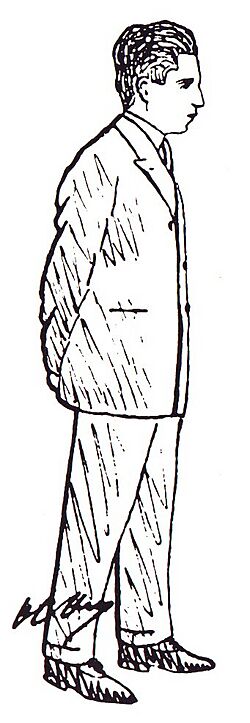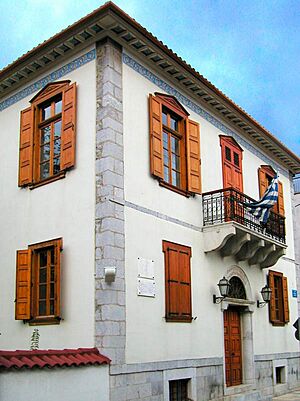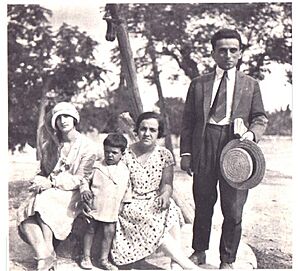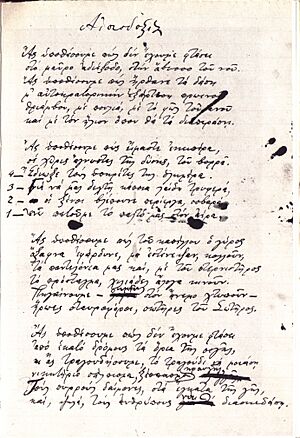Kostas Karyotakis facts for kids
Kostas Karyotakis (Greek: Κώστας Καρυωτάκης, 11 November [OS October 30], 1896 – 20 July 1928) is considered one of the most representative Greek poets of the 1920s and one of the first poets to use iconoclastic themes in Greece. His poetry conveys a great deal of nature, imagery and traces of expressionism and surrealism. He also belongs to the Greek Lost Generation movement. The majority of Karyotakis' contemporaries viewed him in a dim light throughout his lifetime without a pragmatic accountability for their contemptuous views; for after his death, the majority began to revert to the view that he was indeed a great poet. He had a significant, almost disproportionately progressive influence on later Greek poets.
Contents
Biography
Karyotakis gave existential depth as well as a tragic dimension to the emotional nuances and melancholic tones of the neo-Symbolist and new-Romantic poetry of the time. With a rare clarity of spirit and penetrating vision, he captures and conveys with poetic daring the climate of dissolution and the impasses of his generation, as well as the traumas of his own inner spiritual world.
Early life
Karyotakis was born in Tripoli, Greece, his father's occupation as a county engineer resulted in his early childhood and teenage years being spent in various places, following his family's successive moves around the Greek cities, including Argostoli, Lefkada, Larisa, Kalamata, Athens and Chania. He started publishing poetry in various magazines for children in 1912.
After receiving his degree from the Athens School of Law and Political Sciences, in 1917, he did not pursue a career as a lawyer. Karyotakis became a clerk in the Prefecture of Thessaloniki. However, he greatly disliked his work and could not tolerate the bureaucracy of the state, which he wrote about often in his poems. His prose piece Catharsis ('purification') is characteristic of this. For this reason he would often be removed from his posts and transferred to other locations in Greece. During these removals he became familiar with the boredom and misery of the country during World War I.
Adulthood and career
In February 1919 he published his first collection of poetry: The Pain of People and of Things (Greek: Ὁ πόνος τοῦ ἀνθρώπου καὶ τῶν πραμάτων), which was largely ignored or badly reviewed by the critics. In the same year he published, with his friend Agis Levendis, a satirical review, called The Leg, which, despite its success, was banned by the police after the sixth issue. In 1921 he published his second collection called Nepenthe (Greek: Νηπενθῆ) and also wrote a musical revue, Pell-Mell (Greek: Πελ-Μελ).
In 1924 he traveled abroad, visiting Italy and Germany. In December 1927 he published his last collection of poetry: Elegy and Satires (Greek: Ἐλεγεῖα καὶ Σάτιρες). In February 1928, Karyotakis was transferred to Patras although soon afterwards he spent a month on leave in Paris and in June 1928 he was sent yet again to Preveza by ship.
Death
Karyotakis lived in Preveza only for 33 days, until his death on 21 July 1928 at age 31. His work was in Prefecture of Preveza, in the Palios mansion, 10 Speliadou street, as a lawyer for control for land donations from State to refugees from the Asia Minor War of 1922.
Selected works
Poems and collections
- Xeprovodisma (1919) published in «Noumas» (638)
- When you Came... (1919) published in «Noumas» (650)
- Your Letters (1920) published in «Noumas» (671)
- The Pain of Men and Things (1919)
- Nepenthe (1921)
- Song (1922) published in «Pharos» (82)
- Lycabettus ( 1922) published in «Noumas» (765)
- the Ash beyond the Horizon... (1923)) published in «Noumas» (771)
- Varium et Mutabile (1923)) published in «Easter Anthology, 1923 (together with one of his friends Agis Leventis).
- Escape (1923) published in «New Life» (324)
- Prepare (1923) published in «Espero» (3)
- Elegies and Satires (1927) published by printing press "Αthena"
- Optimism (1929) [Posthumously] «Nea Estia» (6, 63)
- Sunday (1929) [Posthumously] published in «Pnoe» (1)
- Preveza (1930) [Posthumously] published in «Nea Estia» (8, 88)
- When we get down the stairs... (1933) [Posthumously] published in «Beginnings» (7, July 1933)
Translations
1. Elegias e Sátiras/Ελεγεία και Σάτιρες, Théo de Borba Mossburger (Trans.), (n.t.) Revista Literária em Tradução, nº 1 (set/2010), Fpolis/Brasil, ISSN 2177-5141
See also
 In Spanish: Kostas Karyotakis para niños
In Spanish: Kostas Karyotakis para niños





